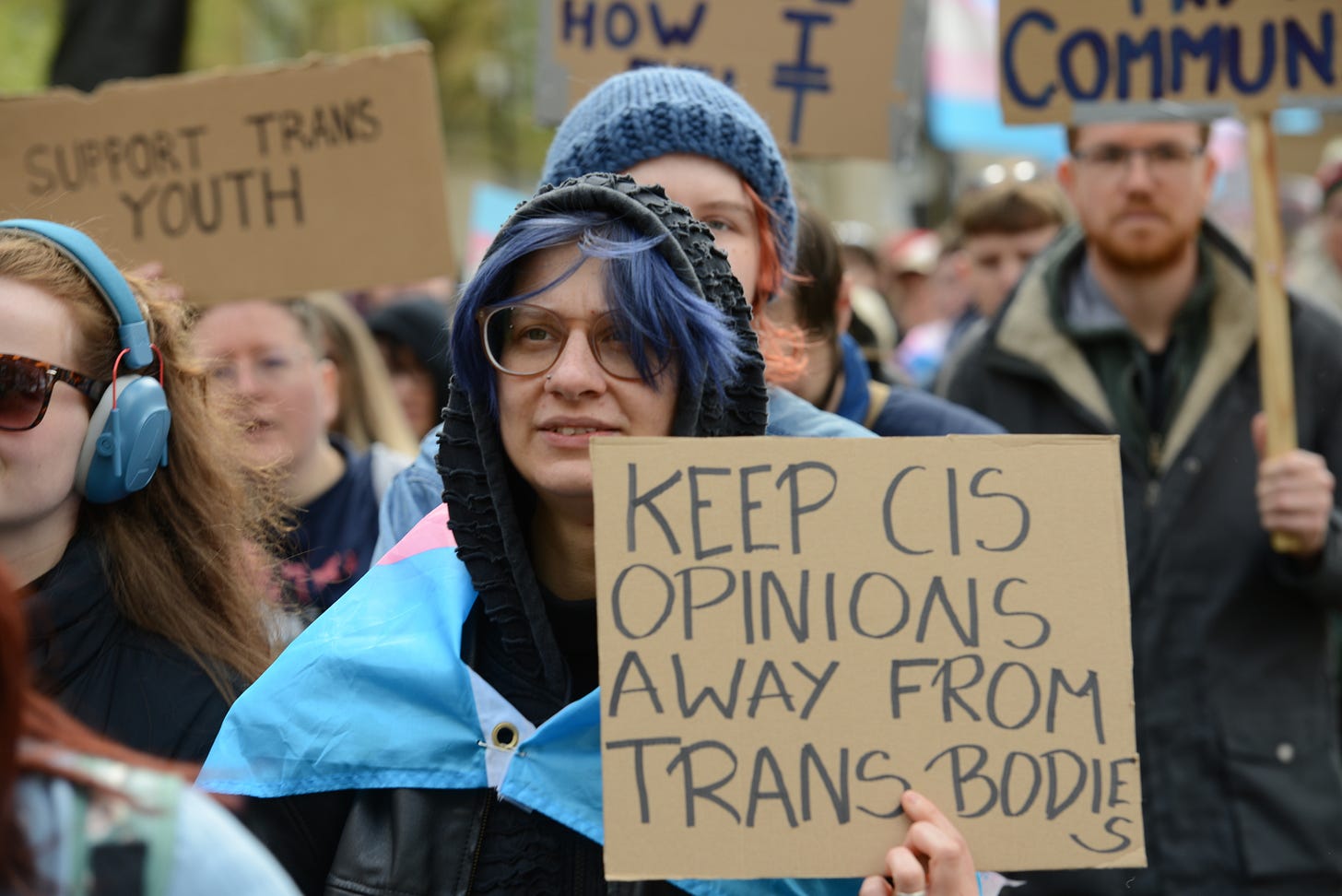Detransitioners deserve to be heard
A guest Substack from Genspect UK director Carrie Clark argues that the NHS is still ignoring the people who know most about puberty blockers.
While there has been something of a shift in the discussion about sex and gender - particularly around the care, or lack of it, for gender-questioning or distressed teenagers - any victory was always going to be fraught, even short-lived. The NHS has recently announced a new trial for gender care - one which will include the prescription of puberty blockers for young people. Titled ‘Pathways’, the announcement has proven controversial, not least because puberty blockers are currently banned for that age group. But perhaps most egregiously, the NHS seems to have failed to include detransitioners in their consultations - the very people who have been through the looking glass of medicalisation and come out the other side.
In the following guest Substack, Genspect UK director and Battle of Ideas speaker Carrie Clark lays out the problems with the new NHS trial, and shares the work Genspect has been doing with detransitioners to tell their story - in the hope that the mistreatment of gender-distressed young people might change. Please read on - and make sure you check out our videos and podcasts on this issue from previous Battle of Ideas festivals.
Detransitioners deserve to be heard before the NHS launches a new trial of puberty blockers

Last week, the National Institute for Health and Care Research approved £10million funding for an NHS trial into the effects of puberty blockers on gender-distressed young people. Although the NHS funding application makes much of the fact that the research has been closely co-designed with gender-distressed patients themselves, the consultation process has actually excluded the people best qualified to speak about the risks it poses.
I work with Genspect, an organisation that campaigns for a non-medicalised approach to sex and gender, and our Beyond Trans project is the only specialist support service for detransitioners in the UK. Detransitioners are people who regret medical transition, a process that often starts with a prescription for puberty blockers and ends in sterilising cross-sex hormones and irreversible surgeries. Despite living with complex physical and mental-health needs, often as a direct result of treatment they received at NHS gender clinics, no Beyond Trans service users were invited to shape the design of the new trial.
Unfortunately, that’s not surprising. The NHS is uncomfortable with detransitioners because they are the casualties of an experiment it has already carried out. Forget the new trial for a moment. By recklessly prescribing puberty blockers and cross-sex hormones to vulnerable people, despite there being no good evidence that these are safe or effective treatments, the NHS has actually been carrying out a massive, unregulated medical experiment for the past 15 years. It has failed to systematically monitor the outcomes of that experiment, but for some Beyond Trans service users it has resulted in crippling regret, life-altering health problems, infertility and sexual dysfunction.
In an effort to get their voices heard, Genspect has published a briefing about detransition and the NHS puberty-blocker trial. We asked Beyond Trans service users to share their experiences of taking blockers. What they told us is alarming. One recounted their shock at being diagnosed with osteoporosis while still a young teenager - ‘worse than my grandma, who is in her seventies’ - highlighting the damage blockers do to bone density during the critical window of adolescent development. Others described lasting sexual problems, even after they stopped taking blockers: ‘They eliminated my sexual function, with painful arousal and no sense of enjoyment even years after stopping them.’ Another theme was the way puberty blockers prevented our service users from addressing the root causes of their distress, with the focus on gender often overshadowing other issues. ‘Puberty blockers inhibited my ability to face my fear of going through puberty and developing into a woman’, said one. In the words of another:
‘I can honestly say they [puberty blockers] didn’t bring anything positive to my life or my mental health. Instead, they amplified feelings of mental cloudiness, confusion and dizziness. These side effects didn’t help with the dissociative patterns rooted in my unaddressed trauma - something my therapist failed to recognise. Instead, I was diagnosed with gender dysphoria, and blockers were recommended.’
The NHS will create more stories like these if it proceeds with a trial. Despite the recommendations of the Cass Review, it has not moved to create a specialist support service to meet the unique medical needs of detransitioners. Some of the physical issues highlighted to us by Beyond Trans service users included hormone imbalances, high blood pressure, urinary incontinence, erectile dysfunction, weight gain and depression. Detransitioners already feel abandoned by the NHS. The decision to launch a new trial, before even providing for the casualties of the last one, only compounds that sense of betrayal.
Understandably, many detransitioners have lost faith in medical professionals. A 2021 survey found that 76 per cent did not notify their doctor when they detransitioned. This, in combination with the woeful lack of long-term data about the outcomes of medical transition, make it notoriously difficult to put a figure on how many people detransition. Research on gender medicine also suffers from alarmingly high rates of loss to follow up, where participants simply disengage from treatment for unknown reasons. Some previous studies have loss-to-follow-up rates of close to 40 per cent, and a proportion of this must be down to detransitioning. A conservative estimate suggests that 10-30 per cent (see Hall 2021 and Roberts 2022) of the young people who participate in the NHS trial are ultimately at risk of detransition, but this is not an outcome the trial will be able to measure. It is scheduled to run for just two years, and we know that transition regret can take 8-11 years to manifest (see Dhejne, 2014 and Wiepjes, 2018).
It doesn’t need to be this way. Politicians and health authorities are very insistent that a new trial is the only way to build the evidence base for puberty blockers, but that’s not true. Another recommendation of the Cass Review that the NHS has yet to follow through on is the data-linkage study. By connecting medical records held by children’s gender services with those held by adult clinics, the data linkage study stands a chance of capturing the experiences of detransitioners, including some of those we support at Beyond Trans. Before placing a new generation of gender-distressed young people at risk in the name of research, the NHS needs to produce the results of the unofficial experiment it has been running for the past 15 years. Most importantly, it needs to listen to detransitioners and ensure that their experiences are informing how it thinks about safety and risk. When we asked Beyond Trans service users what they’d like to say to gender-distressed young people thinking about taking puberty blockers, they had some excellent advice that the NHS could stand to keep in mind:
‘Give yourself time. Growing up is hard, and it’s natural to want quick solutions to feelings of discomfort or uncertainty. But your body and mind are still growing, and decisions like these have lasting consequences. Take the time to truly understand yourself before making choices you can’t undo - you deserve the chance to grow into who you are without regret.’
Carrie Clark is the director of Genspect UK and a writer and researcher. With her friend Helen Pluckrose and a group of dedicated volunteers, Carrie helped found Counterweight in 2020, an organisation that supported people struggling with culture-wars issues in their workplaces, schools and universities. In 2021, she joined Don’t Divide Us, a campaign for colour-blind anti-racism where she co-produced a short film on the censorious impact of the term ‘Islamophobia’ and a series of events on issues including systemic racism and the Commission on Race and Ethnic Disparities Report. Between 2022-2024 she was the research officer at the Free Speech Union (FSU). Follow Carrie on Substack.








As a mother of a child who is in the thralls of this (I did not allow puberty blockers or hormones or surgeries, but, at 16, she took illegal "T" she obtained from the UK in the mail sent to a friend's home for 90 days until I discovered it, and she is now taking synthetic T prescribed after 1 visit at Callen Lorde soon after turning 18 and is 19 today), I am extremely frustrated and disgusted at the arrogance associated with this experiment.
When there is already so much evidence out there from those who were experimented upon without their knowledge that it was an experiment, for the UK to now perform another experiment and suck more children into this mess without even listening to the canaries in the coalmine is a real show of disrespect for detransitioners and for kids like mine, who has not yet realized what she is doing to herself.
It is difficult to just have to sit by and let these "scientists" lie to my child and to a whole generation, making the ridiculous claim that some people were born with the necessity to be treated and referred to as the opposite sex and to be chemically and/or surgically altered to appear the opposite sex in order to have any semblance of happiness and to avoid torment and suicide. This pernicious lie will go down as one of the biggest medical and social scandals of all time.
That these "scientists" won't even acknowledge the sagacious warnings of so many articulate detransitioners and desisters before using off-label drugs on pre-teens who aren't comfortable in their sex makes it clear that they have no interest in actually helping anyone, and only want to satisfy their sick prurient curiosity.
How will such a study wvwr pass muster through a research ethics board when there is a rich mine of data sitting, unpublished, from Olson-Kennedy and from the systematic reviews commissioned from JHU by WPATH that Levine and WPATH and the AAP suppressed? Why go out and harm "fresh children" when so many are already out there? Delusion. The active deceit and gas-lighting of medical science has to stop first. Those sitting on the answers have to stand up and get out of the way! Otherwise this remains an ethical travesty.